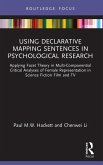The Routledge Handbook of Moral Epistemology brings together philosophers, cognitive scientists, developmental and evolutionary psychologists, animal ethologists, intellectual historians and educators to provide the most comprehensive analysis of the prospects for moral knowledge ever assembled in print.
Dieser Download kann aus rechtlichen Gründen nur mit Rechnungsadresse in A, B, BG, CY, CZ, D, DK, EW, E, FIN, F, GR, HR, H, IRL, I, LT, L, LR, M, NL, PL, P, R, S, SLO, SK ausgeliefert werden.









